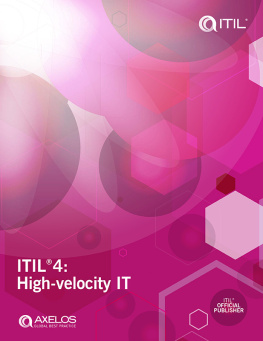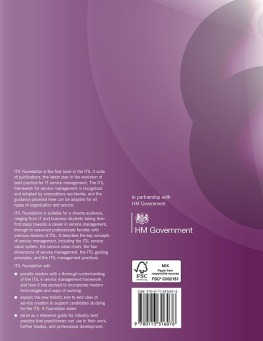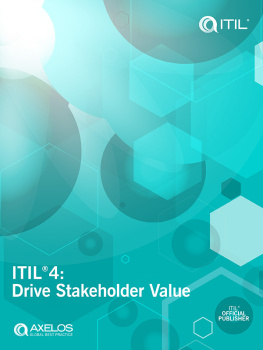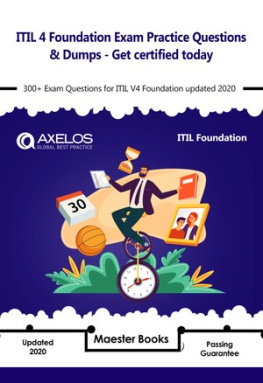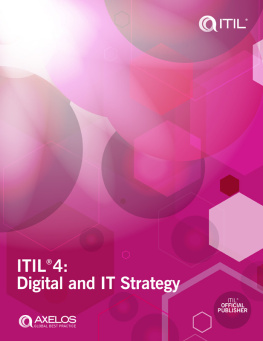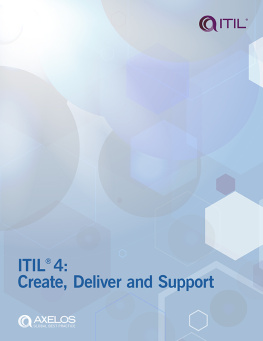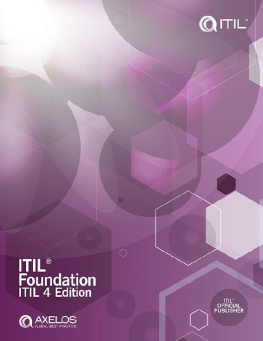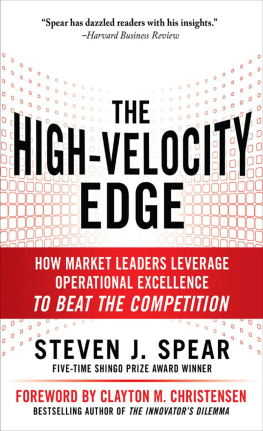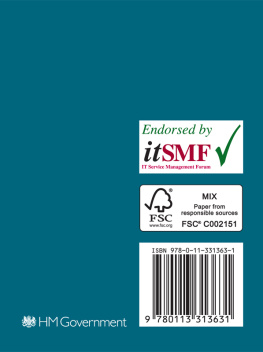Contents

ITIL4: High-velocity IT


Published by TSO (The Stationery Office), part of Williams Lea, and available from:
Online
www.tsoshop.co.uk
Mail, Telephone, Fax & E-mail
TSO
PO Box 29, Norwich, NR3 1GN
Telephone orders/General enquiries: 0333 202 5070
Fax orders: 0333 202 5080
E-mail:
Textphone 0333 202 5077
TSO@Blackwell and other Accredited Agents
AXELOS
Full details on how to contact AXELOS can be found at:
https://www.axelos.com
For further information on qualifications and training accreditation, please visit:
https://www.axelos.com/certifications
https://www.axelos.com/archived-pages/becoming-an-axelos-partner/training-organization-and-trainer-accreditation
For all other enquiries, please email:
Copyright AXELOS Limited 2020
All rights reserved. No part of this publication may be reproduced in any form or by any means without permission in writing from AXELOS Limited.
Applications to reuse, reproduce or republish material in this publication should be sent to the licensing team at: Registered office address: 30 Berners Street, London, England, W1T 3LR
AXELOS, the AXELOS logo, the AXELOS swirl logo, AgileSHIFT, ITIL, MoP, M_o_R, MoV, MSP, P3M3, P3O, PRINCE2, PRINCE2 Agile, and RESILIA are registered trade marks of AXELOS Limited.
.
First edition 2020
ISBN 9780113316403
Printed in the United Kingdom for The Stationery Office
Material is FSC certified and produced using ECF pulp, sourced from fully sustainable forests.
P003017691 c20 02/20
List of figures
List of tables
Foreword
At this new stage in the development of the IT industry, AXELOS is delighted to present ITIL 4, the latest step in the evolution of IT best practice. By building on our experience and bringing fresh and forward-looking thinking to the marketplace, ITIL 4 equips your business to deal with the challenges currently faced by the industry.
The adoption of ITIL as the most widely used guidance in the world on IT and service management will continue with ITIL 4. It ensures continuity with existing ways of working (where service management is already successful) by integrating modern and emerging practices with established and proven know-how. ITIL 4 also provides guidance on these new methods to help individuals and organizations to see their benefits and move towards using them with confidence, focus, and minimal disruption.
ITIL 4s holistic approach raises the profile of service management in organizations and industries, setting it within a more strategic context. Its focus tends to be on end-to-end product and service management, from demand to value.
ITIL 4 is the result of a great deal of global research and development work across the IT and service management industries; this work has involved active practitioners, trainers, consultants, vendors, technicians, and business customers. The architect team has collaborated with the wider stakeholders and users of ITIL to ensure that the content meets the modern requirements of continuity, innovation, flexibility, and value.
ITIL training provides individuals with a structured approach for developing their competencies in the current and future workplace. The accompanying guidance also helps organizations to take advantage of the new and upcoming technologies, succeed in making their digital transformations, and create value as needed for themselves and their customers.
As demand for digital technology grows, practitioners are under increasing pressure to design, develop, run, and support digital systems and services. ITIL4: High-velocity IT aims to help readers understand digital transformation and to guide them and their organizations towards a more integrated state between business and technology. By discussing organizational best practice and useful mental models from a practitioners perspective, it provides invaluable guidance in the practical application of high-velocity IT.
Welcome to the new generation of IT best practice!

Mark Basham
CEO, AXELOS Global Best Practice
Preface
People depend on digital technology. The societal and economic impact of digitally enabled organizations is unprecedented, and these organizations demand a significantly different way of working. We need to strike a new balance between managerial control and professional judgement. IT service management often leans towards control, but digitally enabled organizations are based on complex and intrinsically unpredictable systems. These systems are uncontrollable at lower levels of granularity, so traditional management instruments such as specialization, prescriptive processes, and performance targets do not work. Action at the sharp end has to be based on professional judgement and an understanding of the nature of the systems in which the practitioner works. Practitioners therefore need appropriate high-velocity IT ways of thinking and of working.
As the reader, you care about this not only because you want to remain valuable and relevant in a changing workplace, but also because you have the privilege of contributing to the prosperity and wellbeing of people by providing them with better digital experiences. You have taken the trouble to look at industry guidance such as ITIL, so you are presumably committed to your professional development. You are aware of the considerable challenges and responsibilities involved in managing digital technology. You are up for the challenge and are prepared to review and unlearn old approaches and integrate new concepts in your way of working. You take your work and yourself seriously.
We, the authors, reviewers, and other contributors, each in our own way, are committed to making our industry a better place to work. We believe that people come first. We work in complex human systems in which professionals often have to take gambles. This is defensible: there is limited data available so their actions are based on well-reasoned hypotheses that they calibrate when they observe the results of their actions. In toxic workplaces they could easily be blamed (with the luxury of hindsight) for taking the wrong decisions. This is unacceptable. When your people have to bet, you had better bet on your people. In parallel with the more technical guidance that this publication offers, we draw your attention to the importance of psychological safety, wellbeing, and ethics in the workplace. Many organizations not only have accrued technical debt in their software as a result of taking conscious or unconscious shortcuts, they also have a considerable social debt that needs repayment. This is why we care. This is a pivotal moment. The time is right to share our thoughts and to hopefully be of service.
I have witnessed the concern, engagement, and generosity of those who have contributed to this publication. We believe in its potential. It is now up to you.

Mark Smalley
Lead editor, ITIL 4: High-velocity IT
About the ITIL 4 publications

